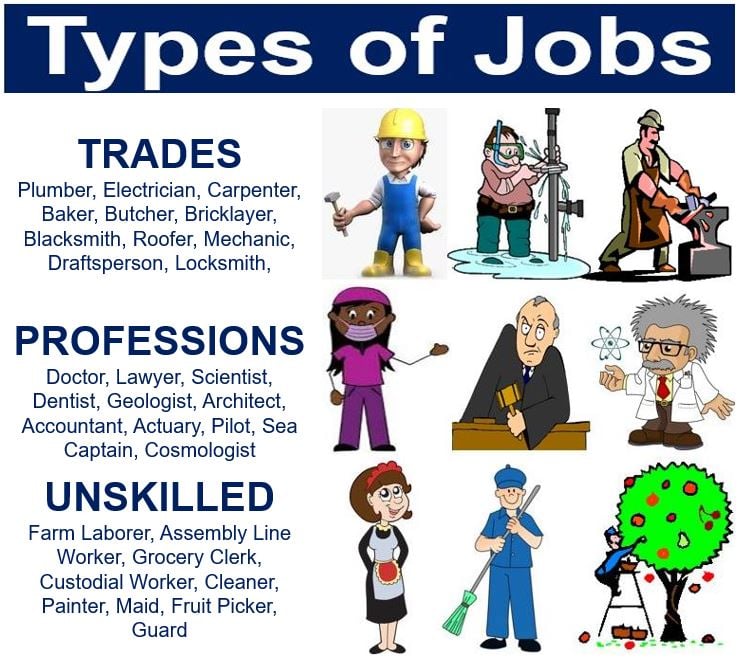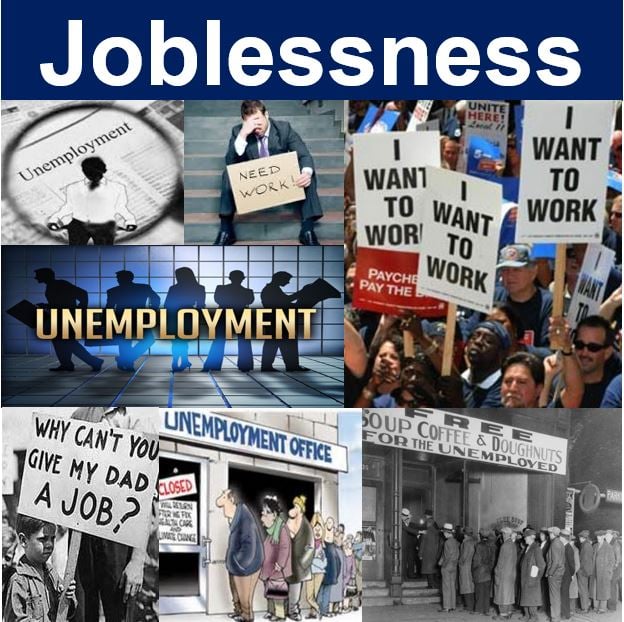The term ‘Job’ can mean:
- A full or part-time position of paid employment.
- A piece of work, usually at a specific price.
- A specific task people do as part of the routine of their occupation.
- A duty or responsibility.
- A project, as in ‘The airport job took twelve months to complete.’
- The performance or execution of a task, as in “She did an excellent job.”
- Colloquially, it can refer to a challenging situation or matter, as in “Organizing the charity event was a big job.”
- In the context of computing, ‘job’ denotes a unit of work or batch of operations that a computer, or a set of computers, is set to perform.
Informally, it can also refer to somebody’s pet going to the toilet. For example “I waited for my dog Tommy to do his job, after which we walked home,” means my dog went to the toilet. A bank job can mean a bank robbery, as in ‘There has been a wave of bank jobs in the suburbs.’

Etymology of ‘job’
According to the Online Etymology Dictionary, the word ‘job’, with the meaning ‘piece of work, something to be done,’ emerged in the English language in Britain in the 1620s, from the phrase Jobbe of Worke (1550s), meaning ‘task, piece of work’.
Some etymologists suggest that it was a variant of Gobbe, which meant ‘mass, lump’, via the sense of ‘a cart-load’.
It was not until the 1650s that the meaning widened to include ‘work people do for pay’.
According to literary records, people first used the term with the meaning ‘a paid, permanent position of employment’ in 1858. From 1795, printers used the word as a slang for ‘piece of work of miscellaneous class’ (handbills, posters, etc.).
In the 1660s, also in Britain, ‘to job’ – as a verb – appeared with the meaning ‘to buy and sell as a broker’.

Types of jobs
In society, most of us have multiple jobs. A person may be an employee, a parent, and homemaker. They are all, in fact, by definition, types of jobs.
People with specialized training in certain types of work, either have a:
Trade
These are manual jobs. Examples include carpenters, auto mechanics, hairstylists, and bakers. Butchers, plumbers, and tree surgeons are also trades.
To become a tradesperson, you usually have to do a course and complete a period of practical work.
Profession
For this type of job you need a university qualification. Examples include lawyers, doctors, dentists, architects, librarians, engineers, and pharmacists. Scientists, physicists, teachers, university professors, and geologists are also professions.
Between trades and professions, there are technical and administration jobs. For some of them, you need a university degree.
We call all other positions unskilled jobs. You do not need any formal qualifications for them. Examples include fruit pickers, maids, janitors, retail assistants, farm laborers, cleaners, etc.
Many CEOs of giant multinationals have no college degrees. In fact, many of them started off at the bottom of the employment ladder and worked their way up. Others went into business and became extremely successful and rich.
Richard Branson, the founder and CEO of the Virgin Group, left school at the age of 16. He has dyslexia and performed badly as a student.
In fact, his Headmaster Robert Drayson predicted that Branson would either end up in jail or become a millionaire. Today he has a net worth of over $5 billion.

Is a vocation a job?
A vocation is a type of job to which an individual is especially drawn. In other words, they receive a ‘call’ or a summons from a higher entity.
Originally, the term was used just for religious callings. However, today we consider many several non-religious occupations as vocations. For example, teaching or medicine are vocations.
The vocation of a nurse or doctor is probably to be a ‘healer’.
Vocation may refer to work that is outside a person’s money-earning sphere of activity. For example, an entrepreneur might have a vocation as a Sunday school teacher or a youth sponsor.
Since the American engineer, social reformer and public intellectual Frank Parsons (1854-1908) published his Vocational Guidance in 1908, the use of the term ‘vocation’ has widened to include the notion of people using their talents and capabilities to good effect in selecting and enjoying a career.

Full- and part-time jobs
In a full-time job, people work about thirty-five to forty hours per week. In a part-time job, however, the working week is much shorter.
The number of part-time jobs in the advanced economies has increased considerably since the turn of the century. Specifically, they have increased as a percentage of total jobs.
Jobs can also be categorized as self-employment, consulting, odd jobs, seasonal, temporary, or contract.
Most people receive money for the work they do. However, some don’t. Examples of unpaid jobs include interns, students, homemakers, and caregivers (UK: carers) of family members. Mentors and volunteers are also examples of unpaid work.
There are thousands of different types of jobs. According to the UK’s Office for National Statistics, there are 27,966 different job titles.

What is a day job?
‘Day job’ is a term that typically refers to low-paying work that people have while looking for their dream occupation.
For example, people may wait on tables in a restaurant or serve drinks in a bar while trying to become athletes, actors, musicians, successful authors. Many people also do this type of work while they are studying for a degree.
The implication of ‘day job’ is that the individual would gladly give it up if they managed to make a decent living from their real vocation.
If somebody is told ‘Don’t give up your day job,’ it is a humorous way of telling them that their singing, acting, writing, or artistic ability is bad.
Job Characteristics Theory is a theory of job design developed forty years ago that is widely used today as a framework to study how work outcomes, including employee **satisfaction and productivity, are affected by certain job features.
** Employee satisfaction or job satisfaction is the pleasure we get from doing our job.
Job description
When a company has a job vacancy, it will try to fill it either internally or externally.
It will first write a job description, which includes everything the employee has to do. The description also has details of the salary, bonuses, qualifications required, etc. It will then place the description in an advert.
The advert will appear either on the company’s notice board or externally in newspapers or employment agencies.
Advancements in technology have not only transformed the nature of jobs but have also revolutionized the recruitment process, making it possible to match candidates to job vacancies more efficiently through sophisticated algorithms.
